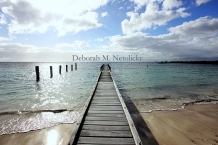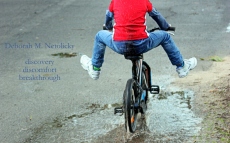Guest Post from Deborah Netolicky. Heutagogical and transformational: Journeys of discovery, discomfort and breakthrough

As a teacher, school leader, coach and researcher, I am constantly immersed in doing, facilitating, thinking deeply about, and interrogating understandings around learning. Heutagogy—the concept first termed by Stewart Hase and Chris Kenyon in 2000 in ‘From andragogy to heutagogy’ —is the notion of self-determined learning. It literally puts the self (‘heut’ is derived from from the Greek, ‘eauotos’, for ‘self’) into the theory and practice of learning. A heutagogical view of learning is grounded in a belief so important in today’s education world of measurements, accountabilities and commodification: a belief in human agency. That is, learners have the capacity to own, drive, determine and propel their own learning.
The importance of agency and internal capacity is consistent with my work in and research around Art Costa and Bob Garmston’s Cognitive Coaching, which aims to produce self-directed, self-managing, self-monitoring and self-modifying individuals. The cognitive coach believes in the capacity of the coachee to draw on their inner reserves, to know and solve their own problems, and to grow cognitively. Coaching conversations can assist people to self-direct their own learning, and contribute to individual and organisational growth.
In the narrative interviews of my PhD study, heutagogical learning emerged from some participants in their discussions of what experiences of learning had shifted their professional identities and practices. Those experiences that participants saw as transformational for themselves included things like parenting and travel. These examples wouldn’t be found on a list of professional learning options for educators, yet they were self-directed experiences that participants found powerful.
For me, my experience of a travelling fellowship was one such experience. With a fellowship awarded by my school, I travelled to New York in order to undertake an investigative series of visits to educators, school leaders, researchers, and edu-experts, in order to further my own learning and to bring back insights that would contribute to the strategic direction of my school. I organised the visits, flights, transport and accommodation. My learning schedule was my own. This was self-directed and organisation-supported professional learning travel that was driven by me as the learner and involved collaboration with others from outside of my normal professional sphere. It was experiential, real world and deeply immersive.

My PhD participants talked about ‘do it yourself’ approaches to their professional learning as among those which were transformative, including online collaborative platforms such as Twitter and blogging. These were perceived to be collaborative global platforms for connecting with like-minded and differently-minded thinkers. One teacher described Twitter as powerful, ongoing, up-to-the-minute professional learning. Participants discussed connected learning using social media as a way to learn and connect with people, trends and resources. They described Twitter as low-cost, constant, daily, individualised professional learning with a worldwide personal learning community in which hierarchies are collapsed and robust, global conversations can occur based on commonalities of interest, rather than role or status. The heutagogical means of social media platforms and blogs can empower educators who seek to be self-directed learners.
As a participant in my own research, I reflected on the difference blogging made to the depth of my online professional connections and conversations. This reflection adds to others’ findings that Twitter is not always an appropriate platform for engaging in lengthy professional conversations which require elaborated reflection on complex ideas. Blogging has allowed me to make more rigorous contributions and engage in more comprehensive conversations than microblogging in 140-character bites allows. The addition of the voice app Voxer has helped to personalise and extend my collaborative conversations.
For me, the PhD was a heutagogical experience. It required me to self-direct, with the guidance and coaching of my supervisors, a sustained research study. It necessitated an ongoing process of reading relevant literatures, planning next milestones, writing and rewriting, thinking and rethinking. Often, I learned the most in moments of fear or discomfort. The notion of DIY scholarship was supported by my practice of searching out online advice about doing a PhD, such as that generously offered by Inger Mewburn, Pat Thomson, Rachael Cayley and Tara Brabazon. I additionally blogged, and continue to blog, my own journey in order to clarify my own thinking and perhaps help others as they navigate the PhD.
A conference, a MOOC or a course might count in our performance-focused world as things we can record as learning on our curriculum vitae of LinkedIn accounts. What emerges from my PhD study and my own experiences of heutagogical learning, however, is that transformational experiences as learning are often not those neatly labelled and packaged as ‘learning’. It is often those experiences that we self-determine—our heutagogical journeys of discovery, discomfort and breakthrough—which can shape our identities, beliefs and behaviours.
Deborah Netolicky


Pingback: Power of a nerd herd: Ode to my people | the édu flâneuse
Pingback: Rethinking professional learning: an academic paper for JPCC | the édu flâneuse
Pingback: Social Media for Good |
Pingback: Digital Pedagogy | the édu flâneuse
Pingback: Choosing the (digital) pedagogical tool fit for the learning | the édu flâneuse